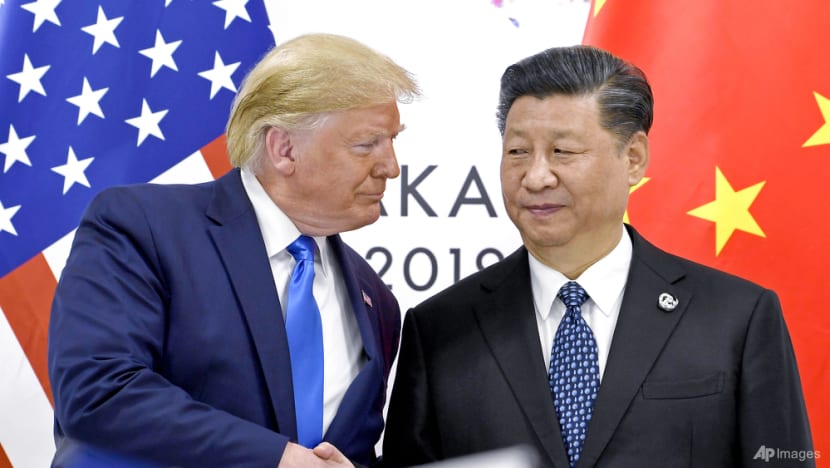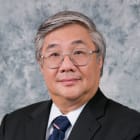When elephants fight, the mousedeer must tread with care to avoid being trampled – deliberately or otherwise, says former diplomat Walter Woon.

US President Donald Trump, left, shakes hands with China’s President Xi Jinping during a meeting on the sidelines of the G-20 summit in Osaka, Japan, on Jun 29, 2019. (File photo: AP/Susan Walsh)
New: You can now listen to articles. 
This audio is generated by an AI tool.

14 Apr 2025 09:56AM
SINGAPORE: There is a Malay and Indonesian saying that “when elephants fight, the mousedeer in the middle dies”.
With geopolitical tensions between the United States and China escalating sharply last week, Singapore as the mousedeer between the American and Chinese elephants will need to be especially nimble to survive.
In a new round of trade tit-for-tat, the US on Wednesday (Apr 9) forged ahead with a staggering 125 per cent tariff on Chinese imports, on top of the 20 per cent imposed earlier this year over the flow of fentanyl from China to the US. China denounced the move as “blackmail” and vowed to “fight to the end”, hitting back hours later with an 84 per cent retaliatory tariff. It raised this to 125 per cent on Apr 11, after the US announced a 90-day pause on reciprocal tariffs on nearly all major trading partners – except China.
Amid this deepening standoff, Washington has intensified its rhetoric. In a Fox News interview this month, Vice President JD Vance referred to the Chinese as “peasants”, saying: “We borrow money from Chinese peasants to buy the things those Chinese peasants manufacture.”
This raises uncomfortable memories of previous Asian-bashing episodes.
Japan was the target in the 1980s. Vincent Chin, a Chinese man, was bludgeoned to death in Detroit by two white autoworkers who blamed the Japanese for the decline of the US auto industry. Such incidents underscore how quickly economic anxiety can become racial hostility.
Today, China is the focus. The anti-China narrative is stoked by uninformed and tendentious reporting by Anglophone media. It is no surprise that China is seen as an enemy by Americans.
SCRATCHING OLD WOUNDS
In the US-China conflict, much has been made of the Thucydides Trap, which holds that a rising power and an incumbent power must clash.
To characterise China as a rising power is mistaken. It is a returning power. The psychology is different. Misdiagnosing the problem risks exacerbating it. That misdiagnosis is a result of historical ignorance.
Europeans think that World War II started in September 1939; to the Americans, it was December 1941. They are wrong. The war started in July 1937, with the Japanese invasion of China. This was the culmination of a century of encroachment by rapacious foreign powers.
China stood alone against Japanese aggression for more than four years. An estimated 14 million to 20 million Chinese people died during the war. This unhappy history impels China to become stronger so that they cannot be bullied again, which appears to some people as aggressiveness.
Washington has repeatedly asserted that Beijing is readying itself to invade Taiwan, with CIA Director William Burns naming 2027 as a potential flashpoint, although Chinese President Xi Jinping has denied such plans .
During his visit to Taipei in March 2022 former US secretary of state Mike Pompeo encouraged secession, tweeting “the US government should immediately take necessary, and long-overdue, steps to do the right and obvious thing, that is to offer the Republic of China (Taiwan) America’s diplomatic recognition as a free and sovereign country.”
And in a breathtaking display of historical ignorance, US Defense Secretary Pete Hegseth, who was in Asia on his first official visit last month, said in Japan that “we share a warrior ethos” to deter China’s aggressiveness.
This is scratching old wounds that have not completely healed. Such rhetoric is likely to feed Chinese paranoia about history repeating itself.
A NEUTRAL VOICE
None of this makes any of the other countries in this part of the world feel safer. A US-China war will be a generational conflict. There will be no winners, least of all the neighbouring countries that will be written off as collateral damage.
Singapore’s relationship with China is complex. The ancestors of most of our population originated from China, principally Fujian and Guangdong. They came to China’s aid against foreign aggression in the 19th and 20th centuries.
But this history does not make us instinctively align with China. China supported Communist insurrections in Singapore and Malaya. Chinese groups were viewed with suspicion and hostility by the government. This changed with the opening up of China. Whereas at one time travel to China was banned, now Singaporeans may freely visit China. Many do, and come back with impressions that are at variance with the picture painted by the Western media.
This gives Singapore an advantage as an interpreter of China for the outside world. Singapore’s media outlets have Chinese-speaking correspondents based across mainland China, Taiwan and Hong Kong, covering wide-ranging topics such as politics, economy, technology, history, society and culture, reporting in both English and Mandarin.
In addition, there are trenchant thinkers like former Singapore Foreign Minister George Yeo and former Singapore Ambassador to the United Nations Kishore Mahbubani. They do not hew to the received interpretation of the Chinese threat prevalent in the US and the West.
In law there is a wise maxim: Audi alteram partem, hear the other side. In the great echoing caverns of the Anglosphere, a neutral nuanced voice is vital.
QUIET DIPLOMACY
Education is another area where Singapore can play a role. The number of student visas granted to Chinese nationals in the US has dropped 50 per cent between 2019 and 2022. Singapore is well-placed to offer an alternative.
An English-speaking environment, safety from racist violence and the opportunity to obtain an education bridging East and West are advantages that can be exploited. Welcoming students from both mainland China and Taiwan could foster deeper ties and mutual understanding. The ties they form will hopefully contribute towards settling the legacy of the Chinese Civil War.
China-Taiwan relations are a family issue. Only the Chinese people can craft a settlement.
Singapore provides a neutral venue for meetings of officials and politicians on both sides of the Taiwan Strait, for instance the meeting between Taiwan’s President Ma Ying-jeou and China’s President Xi Jinping on Nov 7, 2015. If there is to be rapprochement between Beijing and Taipei, Singapore would be the place to start quiet diplomacy.
Most countries do not want to be forced to take sides in the current US-China confrontation. In the latest State of Southeast Asia survey conducted by the ISEAS-Yusof Ishak Institute, 31.4 per cent of Singapore respondents said ASEAN should not side with China or the US. Meanwhile, 46.7 per cent chose the option of enhancing ASEAN unity to fend off pressure from the two major powers.
Being neutral does not mean being mute. A neutral, nuanced voice is vital in an increasingly strident shouting match.
Singaporean business people and students may be viewed with suspicion on account of fancied racial ties with China. Trade and political relations may suffer because of the prejudice of uninformed politicians. Friendship does not confer immunity from being targeted.
For the mousedeer in the middle of the fight between the elephants, a canny appreciation of the situation is essential in order to avoid being trampled, deliberately or otherwise. National unity and resilience are the keystones of national survival.
To borrow a phrase from an earlier era, Singaporeans must keep calm and carry on providing that neutral nuanced perspective.
Professor Walter Woon was Singapore’s Ambassador to Germany, the European Union, Belgium, the Netherlands, Greece and the Vatican between 1998 and 2006. He is currently Lee Kong Chian Visiting Professor of Law, Yong Pung How School of Law, Singapore Management University, Senior Consultant and Non-Executive Chairman of RHTLaw Asia and Chairman of the Society for International Law Singapore.

Comments are closed.